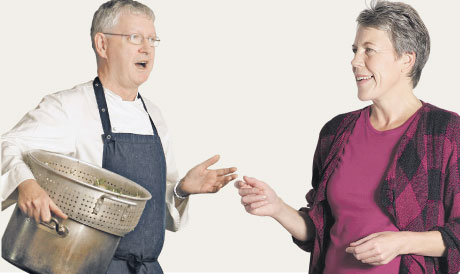
Is it all over for organic food?
Is it still worthwhile buying organic? Farmer Helen Browning and Michelin-starred chef Shaun Hill debate the pros and cons
Is the future still organic? … Shaun Hill and Helen Browning. Photograph: SWNS.COM for the Guardian
Farming and purchase of organic produce is on the decline with sales falling by 5.9% in the UK last year. Oliver Laughland brings together Helen Browning, organic farmer and director of the Soil Assocation, with Michelin-starred chef Shaun Hill to discuss what's driving people away.
Helen Browning: The big dynamic going on is that the price of non-organic food is rising very fast. The price that farmers could get for conventional grain or milk is much higher than it has been, so the gap between the two is closing rapidly and those people who aren't really committed to producing organic might well think they've got an easier life going back to standard production. I'm worried we're going to end up with some quite big shortages in the next year or two of our key ingredients, if we don't keep our farmers farming this way.
Shaun Hill: I use quite a few small producers and for them it's not possible to pay the fees for organic certification inspections. I use them and it's fine by me, but isn't the organic movement maybe losing out a bit?
HB: We've bent over backwards to try to make sure that it's affordable for very small producers, but that's hard. There's a limit to how affordable you can make it. In an ideal world, you wouldn't need to certify things because we'd all be visiting our farms and buying directly from producers. We're not living in that world.
SH: I'm broadly in favour of the organic movement, I just don't think it covers all the options. The veg box movement, for example, was a pain for people such as me because I don't want somebody else to choose what veg I have on a weekly basis. The ingredients I buy specifically because they are organic are meats such as chicken where there is an enormous difference in the welfare and the feed that the animals get. But organic has been a bit of a victim of its own success, you can get Zimbabwean courgettes in January with thousands of air miles on them because they tick all the organic boxes.
HB: We looked quite hard at banning air trade a few years ago and decided not to. We know that the developing world needs to generate cash. Air trade isn't perfect, but less than 1% of our food is air traded. Organic certification gives you the guarantee that even if it's come from Kenya, you know it has been grown in the right way, and that people are likely to have been rewarded fairly for growing it; the soil would have been looked after and it would have been a much better and more sustainable system.
SH: Do you not think though, with the expansion of organic food, producers whose hearts aren't in it are able to jump on the bandwagon and tick boxes that aren't actually doing us much more good? A lot of the quality of a vegetable or poultry is to do with the breed or variety. I'm not sure under this system whether we're getting the right varieties of vegetable and the right breeds of pig and chickens with an organic label.
HB: It's hard to specify, "You must grow this particular variety". It's one of the reasons we run the organic foods award. We're trying to showcase fantastic taste.
SH: But the next difficulty is when you move away from production to manufacture of, say, organic wine. There's a lot of pretty awful organic wine out there that is presumably there because it's organic rather than because it's good.
HB: I think a lot of the organic wines that were dreadful have gone because people stopped buying them. I'd be interested to think about how we could help. Is there a way that we could put up taste barriers? Whose taste buds do we use to evaluate?
SH: You can borrow mine!
HB: It's always in our interest to make sure that our produce is as great to eat as it can be. Anybody, whether they're organic or not, who doesn't think about the quality of what they're producing and whether people are going to eat it, is bonkers. It's common sense that's gone out of farming for a long time. If you look at what's happened to the pork industry over the past 30 years, we've bred lean, lean pigs that grow at a million miles a day and they don't taste of anything and so people have stopped eating pork.
SH: They've stopped eating pork because pork is bloody awful. You can sometimes imagine that you're not cooking it properly but it's just rubbish materials.
HB: They are. I run a farm and pub, and we produce and sell a lot of pork because once people come to eat great pork again, they love it. And I think there is a demand, you just need to introduce people to things and you need to build the market up.
Oliver Laughland: What can be done to make organic and better produce more affordable?
SH: I don't think it should be a more affordable option. I think the cheap food lobby has done a huge disservice to people by giving expectations of having chicken the same price as the packaging.
HB: One of the things we're attempting to do is to launch a campaign that is very much about trying to make sure that people most in need will benefit from a better, more organic diet and are not prevented from doing that by accessibility and affordability. We've got schools in Hackney 40% organic on 60p a day. It can be done. I agree with you that the cheap food culture is one that has dogged us terribly, but we also need to be aware that there are people who are on really tight budgets and we need to make sure that organic food is accessible to them.
OL: Do restaurateurs have an obligation to encourage awareness?
SH: The main obligation of a restaurateur is to stay in business despite rocketing overheads. I manage but it's a tough call for anybody who's attempting to do anything a bit better than the rest because you're competing with people who are less scrupulous than yourself. You've got to hope for the best, really. But you still get people in restaurants looking for a children's menu full of alphabet spaghetti and chicken nuggets – how on earth do you think these poor devils are going to appreciate a decent meal 10 years down the line?
HB: For all of us, wherever you're coming from, farming or owning a restaurant, it's quite hard to be doing something that's better, and to make a success of it. Luckily, I think the world is changing. More and more people appreciate the value of food in its widest sense.
SH: Well, we'll live in hope!

No comments:
Post a Comment